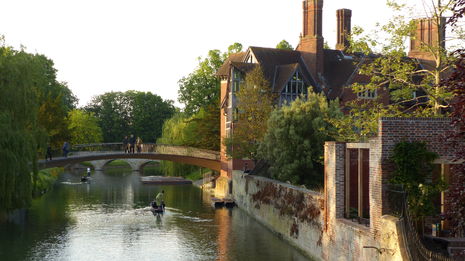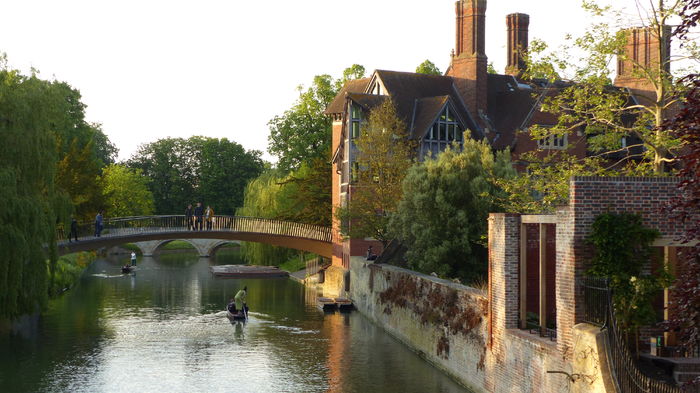Punting under threat from crumbling locks
The Conservators of the River Cam claim that without intervention, the locks maintaining the river’s water levels will collapse, with some calling on the University to help cover costs

The organisation responsible for maintaining part of the River Cam has warned that punting could become unviable if two of the river’s locks are not repaired, threatening water levels.
The Conservators of the River Cam (CamCon) has been responsible for maintaining a six-mile stretch of the river since 1702. However, the organisation is struggling financially and is in danger of collapse, which puts completion of the necessary repairs in doubt.
Water levels on the Backs are controlled by lock islands, which are several hundred years old. Jesus Lock island is located where punting begins, and Baits Bite Lock is situated a few miles north along the river. Without them, this stretch of the river would be incredibly shallow.
According to CamCon, these locks are in a state of disrepair, with a risk that they could collapse entirely. Were this to happen, water levels could drop so significantly that the Backs would no longer be able to support punts.
CamCon chairman David Goode, speaking to The Times, described the impact this could have on both the river colleges and the city as a whole. “In the past the river level was much lower,” he said. “If what is holding the water back collapses, all the water drains away and what you’re left with is a measly, muddy trickle that definitely won’t support the punts.
“There would be a lot of consequences: the loss of punting, exposing of the foundation of college walls and the devastating impact to the appeal and economy of Cambridge,” he continued.
Rowing could also be threatened, Goode added, as college boat clubs would be beholden to fluctuating water levels as well as extensive weed growth, preventing them getting boats out on the river.
According to CamCon, both Jesus Lock island and Baits Bite Lock require repairs. Goode told The Times that they “had a report last year that said Jesus Lock island was in imminent danger of collapse. If it was imminent a year ago it’s not going to get better”.
The organisation said that to carry out temporary stabilisation works would cost about £1.5 million for each lock island, but that ideally the islands would both be replaced. They said that this would likely cost about £10 million to £15 million each.
However, CamCon is facing mounting financial difficulties, making repairs on this scale currently unlikely. According to a written update sent to residents, titled “an organisation in crisis,” CamCon said it risked insolvency were it to carry out any more major repair works. Describing its financial situation as “urgent,” the organisation claimed that it “may yet need to be incorporated into another organisation or simply become unviable and inoperative”.
CamCon was created by an act of Parliament in 1702, which limits its fundraising sources. Its primary income is drawn from registration fees for vessels on their stretch of the river. It seeks to change this fundraising structure, allowing it to collect money from residents, businesses, and the university, as users of the river.
Some punting companies are concerned by the possibility of this change, as well as the threat to their livelihoods posed by the decaying locks. Matthew Marks, who runs Cambridge Chauffeur Punts, told The Times, “There would be an uproar if they try to stop punting and rowing,” adding that “[o]ther people would have to step up.”
Nevertheless, he was critical of the recent management of CamCon, stating, “I’ve never known my fees to go down – they go up every year.”
There are also calls for the University’s colleges to contribute to the cost of repairing the lock islands, given their reliance on tourism enabled by punting.
Anne Miller, co-chairwoman of Cam Valley Forum, a voluntary group established in 2001 to help improve the environment of the River Cam, told The Times she supports this approach: “If the river is fetid sludge the tourists aren’t going to want to come; the colleges along the river are going to suffer.
“Trinity College is one of the wealthiest organisations in the country alongside the Church and the royal family. You think: come off it, guys. Let’s shove some money in a pot and get these locks properly fixed. They were built centuries ago,” she added.
“We are a techy city. We’ve got loads of billionaires, wealthy colleges, wealthy businesses from Microsoft to AstraZeneca. If everybody puts a chunk in a kitty we can get this sorted,” she added.
 News / Judge Business School advisor resigns over Epstein and Andrew links18 February 2026
News / Judge Business School advisor resigns over Epstein and Andrew links18 February 2026 News / Hundreds of Cambridge academics demand vote on fate of vet course20 February 2026
News / Hundreds of Cambridge academics demand vote on fate of vet course20 February 2026 News / Petition demands University reverse decision on vegan menu20 February 2026
News / Petition demands University reverse decision on vegan menu20 February 2026 News / CUCA members attend Reform rally in London20 February 2026
News / CUCA members attend Reform rally in London20 February 2026 News / Gov grants £36m to Cambridge supercomputer17 February 2026
News / Gov grants £36m to Cambridge supercomputer17 February 2026










